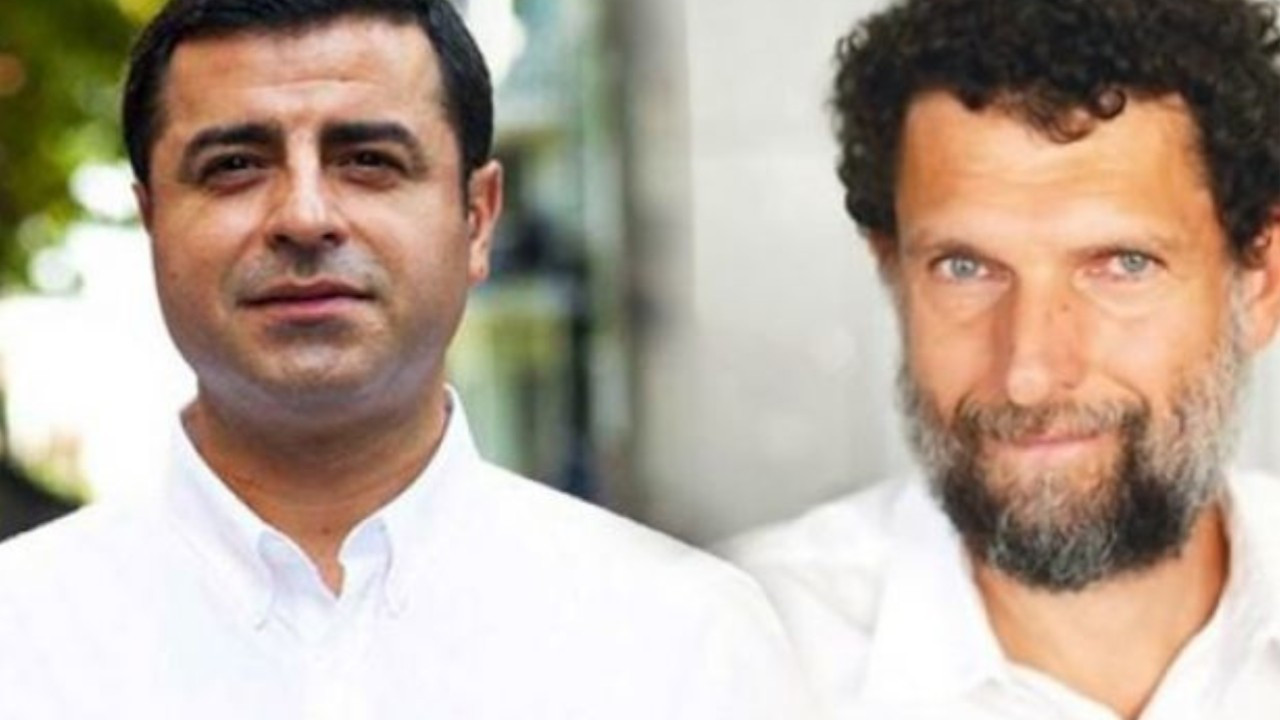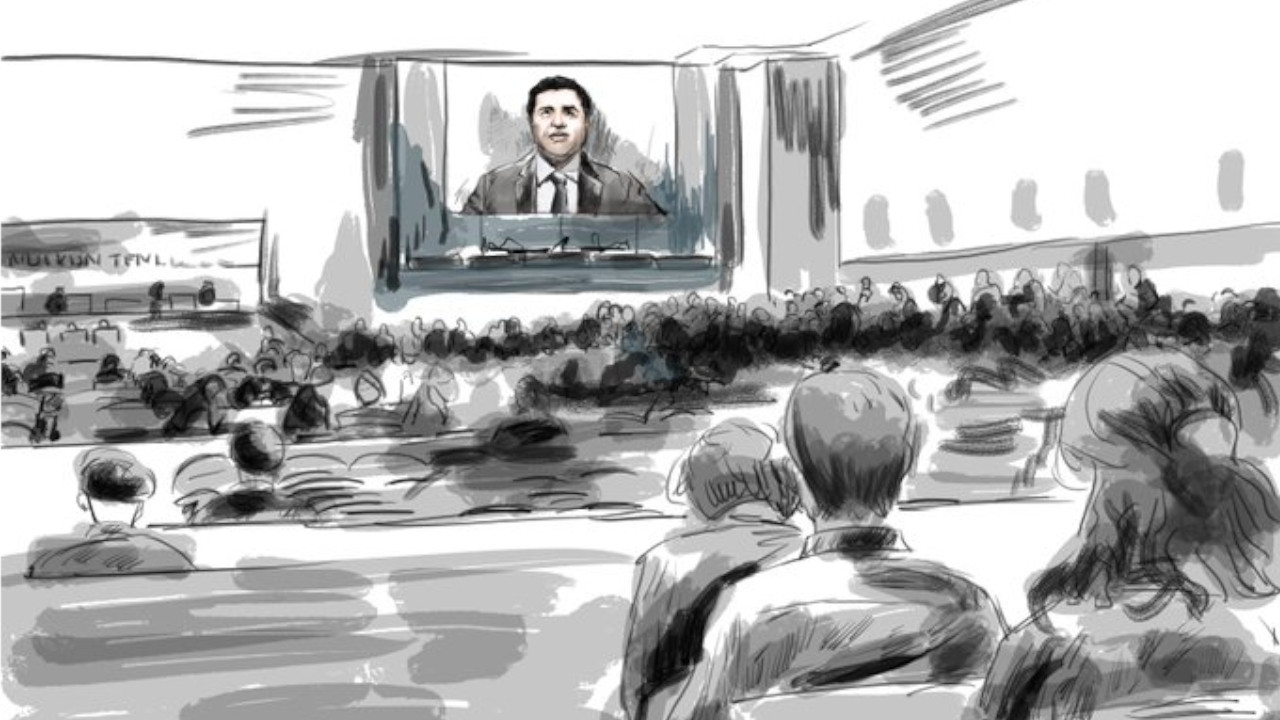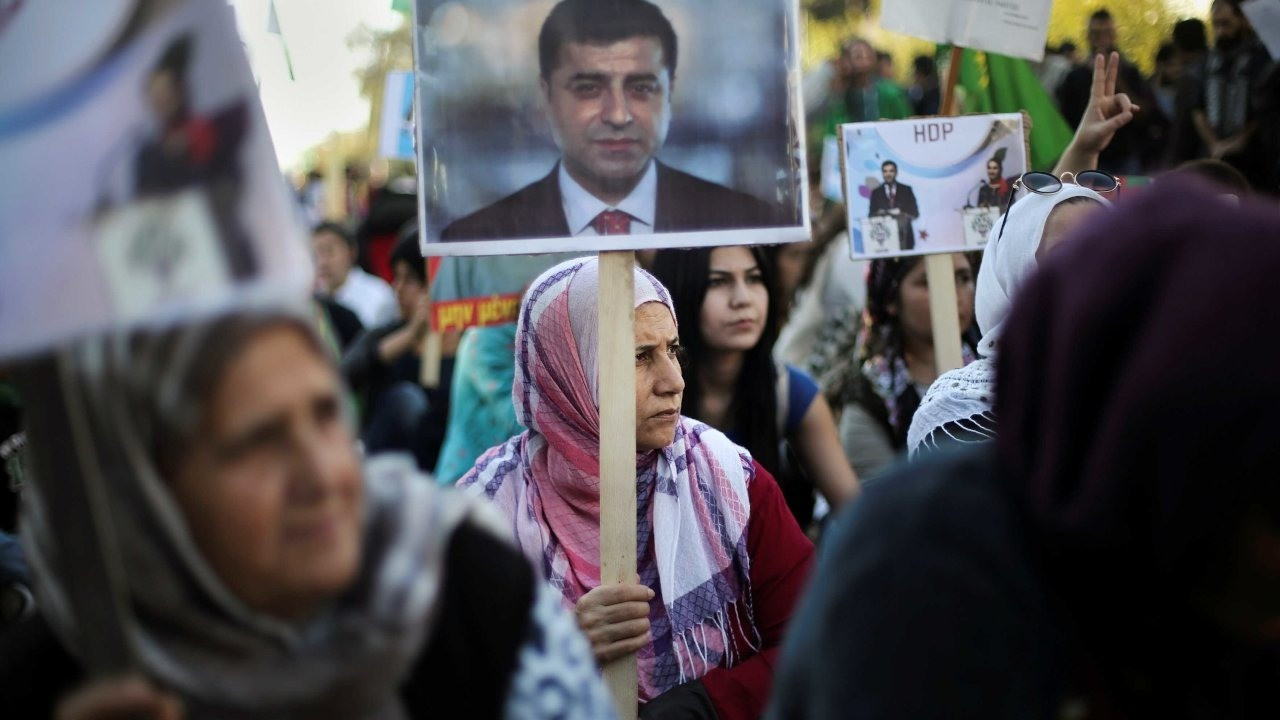Kurdish politician Demirtaş imprisoned for five years, counter to top European rights court ruling
Despite the ECHR ruling that Selahattin Demirtaş was wrongfully imprisoned and must be released, the former pro-Kurdish HDP leader has been continuously imprisoned since 2015. In an interview on Fox TV, his wife Başak Demirtaş said that the renowned politician has not had visitation rights for the last nineteen months. The Turkish censorship board later announced that it has launched an investigation into the TV channel over Başak Demirtaş's remarks.
Duvar English
Selahattin Demirtaş, the former co-chair of the pro-Kurdish Peoples' Democratic Party (HDP), has been kept in prison for nearly five years despite a European Court of Human Rights (ECHR) decision saying he needed to be released.
According to Article 90 of the Turkish Constitution, the Turkish government is obliged to comply with ECHR decisions, however, the ruling Justice and Development Party (AKP) government has kept him unconstitutionally detained. According to his wife, Başak Demirtaş, he has now been denied nearly all prisoners’ rights and has not been allowed visitation in over 19 months.
Demirtaş was detained on Nov. 4, 2016, along with several HDP MPs and HDP co-chair Figen Yüksekdağ. As part of the mass arrests following the July 2016 coup attempt, they were charged with spreading “terrorist propaganda” for the Kurdistan Workers’ Party (PKK), which the Turkish government considers a terrorist organization. Demirtaş and Yüksekdağ vehemently denied these charges.
In January 2017, prosecutors announced they were seeking a 142-year prison sentence for Demirtaş on hundreds of charges, but he has yet to be convicted for these. In September 2018, he was formally sentenced to four years and eight months in prison for a speech he made on Kurdish New Year (Nowruz) in 2013, which prosecutors said incited violence. His lawyers immediately appealed this decision. Two months later, in November 2018, the ECHR ruled that Mr. Demirtaş’s continued pre-trial detention was not constitutional and that he must be released or charged. The Turkish government failed to do this, stating that the ECHR ruling was not binding.
Demirtaş’s lawyers appealed his 2018 sentence to the Turkish Constitutional Court, and in June 2020 the high court determined that his imprisonment violated his constitutional rights. In December 2020, six months later, the ECHR issued another landmark ruling, stating that Demirtaş was wrongfully detained and needed to be released immediately.
According to Article 90 of the Turkish Constitution, international agreements that Turkey is a party to - like the charter of the ECHR - “carry the force of law.” In other words, Demirtaş’s ongoing detention is illegal according to the Turkish Constitution.
In September 2021, the Council of Europe's Committee of Ministers, which oversees the implementation of ECHR's decisions, issued a final warning to the Turkish government to release Demirtaş and fellow political prisoner Osman Kavala. Despite this, Demirtaş is still being tried in a trial dubbed the "Kobane Trial," for which he faces several life sentences.
Başak Demirtaş, who has not had a face-to-face visit with her husband for 19 months, says he was detained for his political activities. She called for his release and the release of all political prisoners and prisoners who are ill.
“We are fighting for peace and democracy to come to Turkey," she said in an interview with İsmail Küçükkaya on Fox TV on Oct. 6. "Political prisoners should be freed and sick prisoners should not be kept in prison."
She added that Demirtaş is detained and the Turkish government is defying both the Constitutional Court and ECHR decisions because of the political threat he posed to the ruling AKP.
"Selahattin is inside because the rulers of this country wanted it, not because he was guilty of any crime,” she said.
According to Başak Demirtaş, prison officials changed visitation rights for prisoners at the beginning of the Covid-19 pandemic. She did not see her husband at all for the first three months of the pandemic. Since then, she and her daughters have only been allowed “closed visits,” where they speak to Mr. Demirtaş through a window via telephone, at infrequent intervals.
“Our girls have not been able to hug their father for 19 months,” she said. “At this point, it is just arbitrary.”
She said they have been given no explanation for why they still cannot see Demirtaş face-to-face. She has appealed to the Justice Ministry for a justification but has not been given one.
In addition to her husband’s imprisonment, Başak Demirtaş also commented on the recent discussion concerning the Kurdish question. Recently, main opposition Republican People's Party (CHP) leader Kemal Kılıçdaroğlu said that the HDP would be the “legitimate interlocutor” to resolve the Kurdish question. HDP co-chair Mithat Sancar welcomed the assertion of Kılıçdaroğlu.
“The HDP is making an enormous effort to democratize Turkey,” she said. “I am a Kurdish woman from Lice, in Diyarbakir. I am also a citizen of the Republic of Turkey. I want to live in peace with all of my identities […] Everyone has the right to live in peace with their own language and culture.”
On a more personal note, she said she maintains a connection with the wives of CHP leaders. She is in frequent contact with both Kılıçdaroğlu’s wife, Selvi Kılıçdaroğlu, and the wife of Istanbul CHP Mayor Ekrem İmamoğlu, Dilek İmamoğlu. At critical moments, they convey messages of solidarity to each other.
Despite her anger at his husband's ongoing imprisonment, Başak Demirtaş said that the former HDP co-chairman is remaining strong and his will is unbroken, as evidenced by the completion of his most recent book, Efsun, which was published on Oct. 2.
“Efsun is the fourth book Selahattin has written,” she said. “He is waging a war of will against his imprisonment. Four walls have been built around him, but by producing like this, perhaps he is able to render those walls meaningless and ineffective.”
Turkey's broadcasting watchdog, the Radio and Television Supreme Council (RTÜK), later announced that it launched an investigation into Fox TV over Başak Demirtaş's remarks.
FOX yayın kuruluşunda bugün gerçekleşen bir programda konuk Başak Demirtaş’ın sözleri ve açıklamaları nedeniyle 6112 sayılı Kanun çerçevesinde inceleme başlatılmıştır. pic.twitter.com/XjelNh2KAb
— RADYO VE TELEVİZYON ÜST KURULU (@rtukkurumsal) October 6, 2021

 Council of Europe issues final warning to Turkey to release Kavala, DemirtaşDiplomacy
Council of Europe issues final warning to Turkey to release Kavala, DemirtaşDiplomacy Court manipulated ECHR's decision in translation for Kobane trial: DemirtaşPolitics
Court manipulated ECHR's decision in translation for Kobane trial: DemirtaşPolitics Legal struggle for Demirtaş 'is also one for the truth'Politics
Legal struggle for Demirtaş 'is also one for the truth'Politics